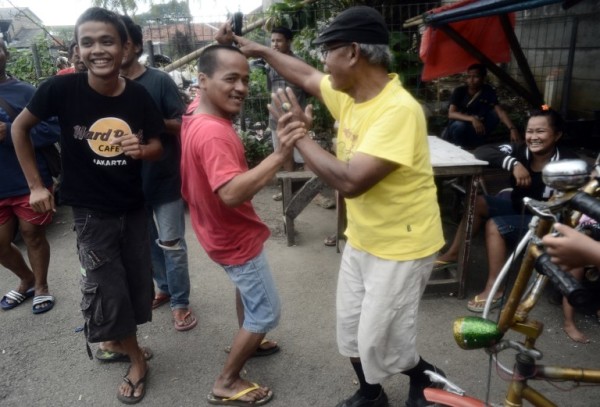Pimp my rickshaw: Indonesian karaoke goes mobile

This picture taken on March 15, 2016 shows Rudi Hantoro (yellow shirt) dancing with his clients beside his pedal-powered rickshaw (R), equipped with a powerful karaoke sound system and a small screen that displays videos and lyrics, in the city of Depok on the main island of Java, Indonesia. The musical pedicab is among a wave of new innovations helping Indonesians indulge their love of singing wherever they can, from specially equipped trains and buses to services that bring karaoke to your home. AFP
DEPOK, Indonesia — An Indonesian rickshaw fitted with a karaoke machine blasts out loud music next to a row of food stalls, as revellers sing and dance enthusiastically nearby.
The musical pedicab is among a wave of new innovations helping Indonesians indulge their love of singing wherever they can, from specially equipped trains and buses to services that bring karaoke to your home.
Once considered a morally-questionable pastime that went hand in hand with drinking alcohol and prostitution in the Muslim-majority nation, karaoke has cleaned up its image in recent years and is now a firmly mainstream form of entertainment, as in much of Asia.
While the most popular venues for karaoke remain bars, where groups of friends typically sing together in private rooms, the new options are helping crooners belt out tunes in more unlikely settings.
Among the new karaoke entrepreneurs is Rudi Hantoro, who has pimped his pedal-powered rickshaw, equipping it with a powerful sound system and a small screen that displays videos and lyrics.
Article continues after this advertisement“This is karaoke for everyone, bus drivers and housewives, students and taxi drivers,” the 65-year-old told AFP, as a tattooed man sang a rock ballad and his friends danced alongside his vehicle.
Article continues after this advertisementHantoro operates his “Karaoke Bike” in the city of Depok, on the main island of Java, cycling to people’s houses when he receives an order, or setting up on a street corner.
One of his regular spots is by food stalls that sit next to a minibus depot and train station, where he has a loyal band of followers, made up of mainly bus drivers.
The cost is reasonable — three songs for 5,000 rupiah ($0.35) or seven for 10,000 rupiah — and his offerings include Indonesian rock, English-language classics and “dangdut”, a type of local pop music famed for its lewd lyrics and raunchy dance moves.
“When I have had a fight with my wife, I sing sad songs here,” said Abdul Haris Jamaludin, a 28-year-old minibus driver and regular customer.
‘Karaoke whenever, wherever’
Not all the new karaoke innovations are so competitively-priced, however, with some aimed at a growing army of consumers, whose wealth has increased in recent years on the back of strong economic growth.
One such option is train carriages fitted out with karaoke systems, which can be rented by groups who want to hold a party on the move for between 20 million and 40 million rupiah ($1,500 to $3,000).
There is a choice of 20- to 28-seater carriages, which used to be part of a presidential train and are decorated with paraphernalia from the many different cultures found in the archipelago.
Once rented, a carriage is fitted to a train making an already scheduled journey across Java, and there are several routes to choose from.
In Jakarta, a party bus, “Royale VIP”, is available for hire and boasts a karaoke machine, two poles for dancing and laser lights, so revellers can party as they battle through the capital’s notorious traffic.
For those wishing to enjoy a spot of crooning without leaving the comfort of their homes, there are several offerings in the capital, including “Splash Mobile Karaoke”.
With the catchline “Karaoke whenever, wherever, you choose the place, we get everything ready”, the service was set up two years ago and business is now booming, according to founder Benny Navaro.
He provides music for a range of events, including weddings, birthdays, farewell parties and family reunions.
“Indonesians can be shy at live-music events, but when they are given a big screen with lyrics, they push aside their worries about sounding out of tune and get down to singing,” Navaro said.
While most practice a moderate form of Islam in Indonesia and don’t find karaoke offensive, there are still some conservative Muslim elements who view karaoke bars as dens of sin.
Some nightspots choose to close during Islam’s holiest month of Ramadan rather than risk attracting the ire of hardliners.
But a growing number of Indonesians just can’t get enough.
“If only there was more entertainment like this for everyday people,” said Jamaludin, at the karaoke rickshaw in Depok. “If you have problems at home, this can really cheer you up.”